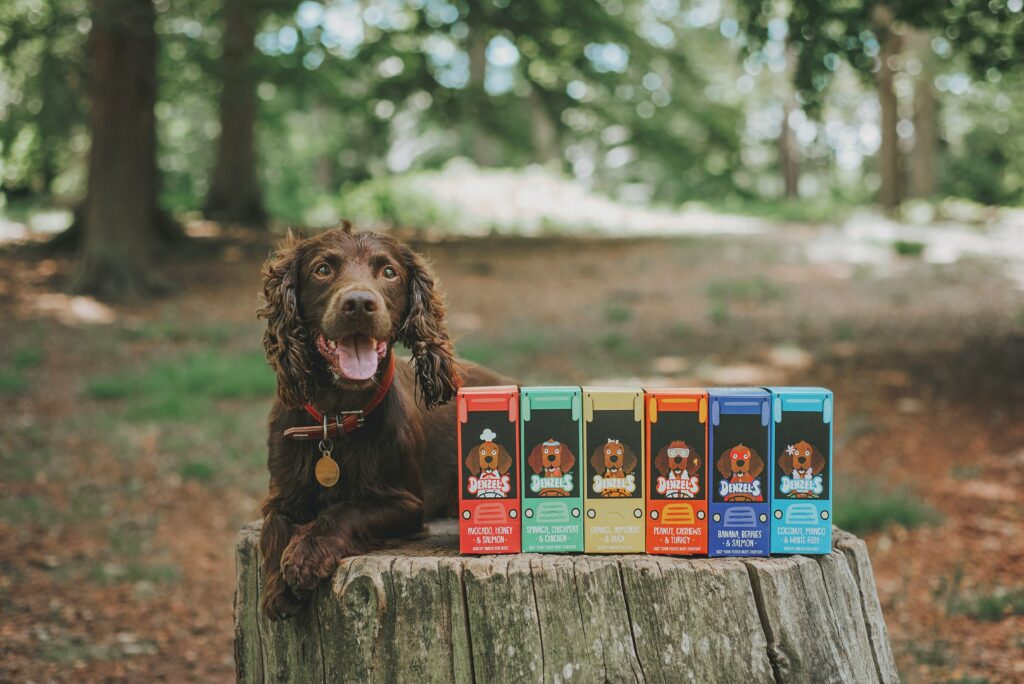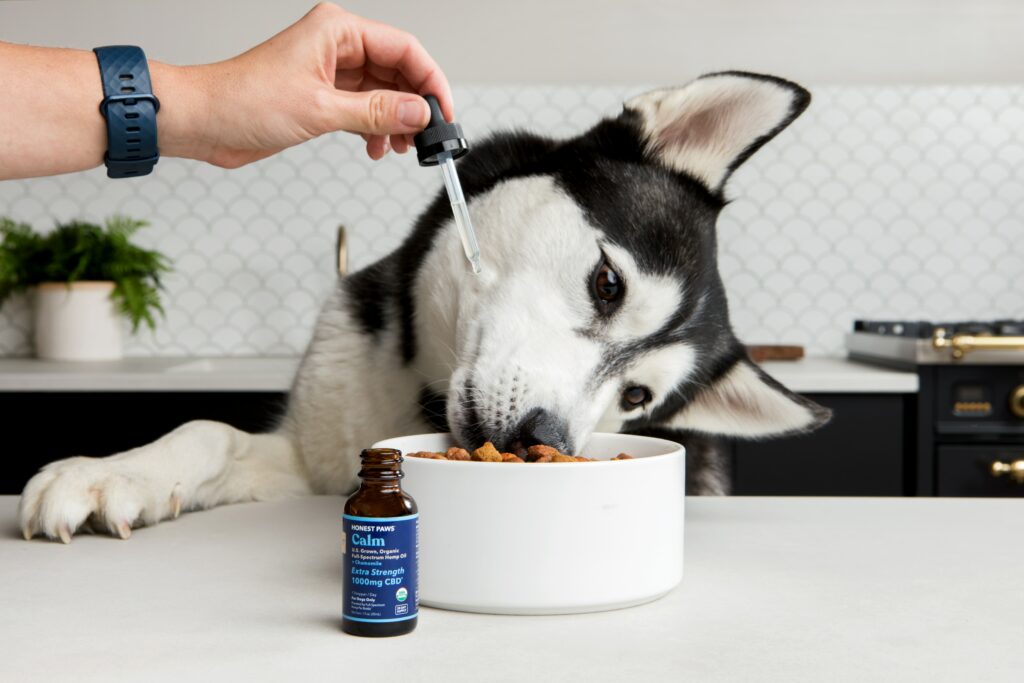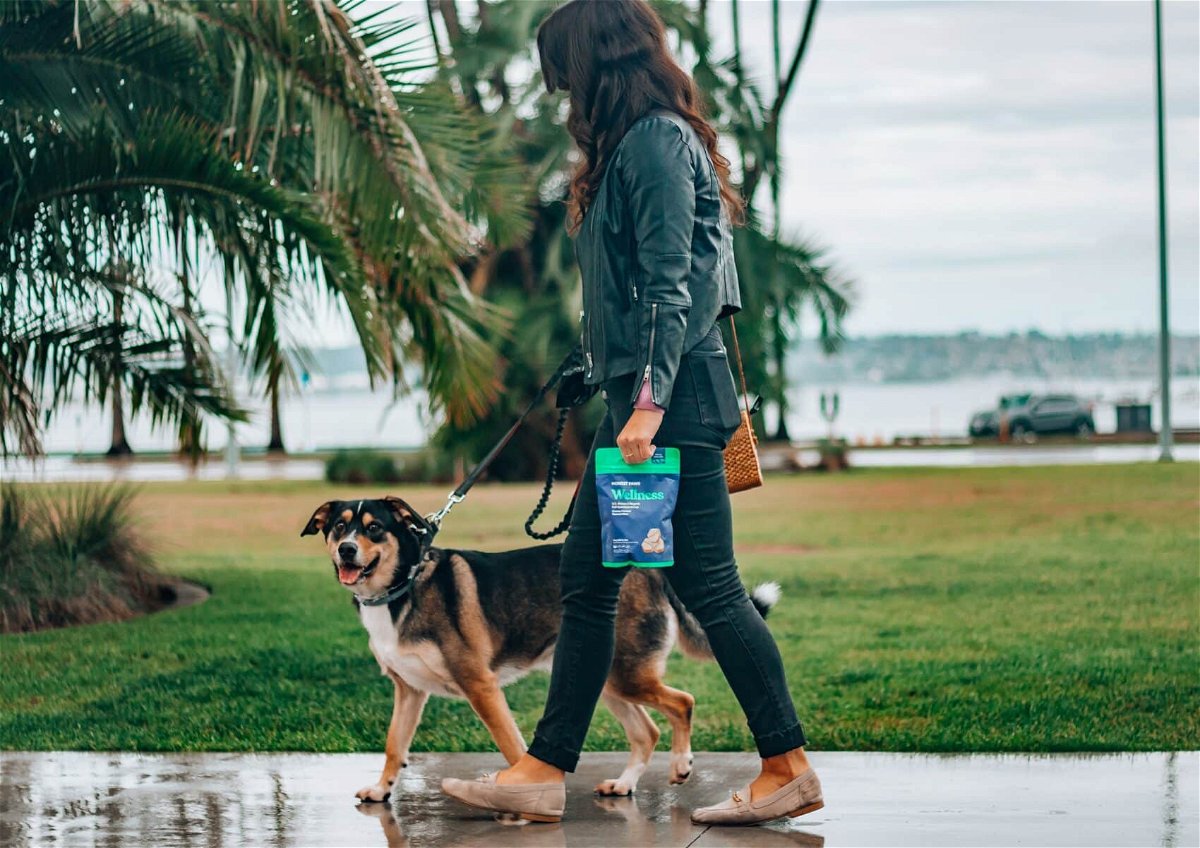We're an affiliate
We hope you love the products we recommend! Just so you know, we may collect a share of sales or other compensation from the links on this page at no additional cost to you. Thank you if you use our links, we really appreciate it!
The benefits of probiotics in dogs cannot be overstated. Giving your dog a probiotic is a great way to improve their overall health.
Probiotics contain beneficial bacteria that are naturally hosted in the dog’s GI tract. They can be used both as preventive or therapeutic supplements for dogs. They help in curing and preventing some gastrointestinal infections.

The following are some of the proven benefits of probiotics in dogs:
- Aids in proper digestion
- Prevents diarrhea
- Helps dogs to transition between diets
- Balances dog’s microbiome
- Strengthen the immune system
- Manages yeast infections
- Reduces effects of medication
- Reduces stress and prevents anxiety
- Reduces allergies
- Improve dog’s oral health
- Improves the overall health of your dog
We will explain each benefit in this article following our research of scientific data.
You should always consult your vet before starting your dog on a new probiotic. Your dog will undergo medical tests to determine which bacteria they need most.
Follow your vet’s advice and monitor how your dog responds to the supplements.
What Does a Probiotic Do for Dogs
Canine probiotics contain living microorganisms that are beneficial for dogs. They release good bacteria into your dog’s gut and support existing ones when consumed.
Healthy probiotic support for dogs will help in balancing the microflora in your dog’s GI tract. The microflora is a mix of good bacteria, bad bacteria, enzymes, and yeast.
It is from the gut where the probiotics work begins. The largest number of the dog’s probiotics are hosted in the large intestines.
Do All Dog Probiotics Have the Same Benefits?
Five main groups of beneficial bacteria are found naturally in the dog’s gut. They are:
- Lactobacillus acidophilus
- Enterococcus faecium
- Bifidobacterium lactis
- Lactobacillus casei
- Bifidobacterium breve
Each of these bacteria species has its specific functions in the dog’s body. Some functions overlap but they perform better when working together.
The Bifidobacterium group helps dogs slow down on diarrhea, and reduce constipation. They are also effective in improving the dog’s immunity to diseases.
The Lactobacillus group helps to optimize the digestive system. They also work to increase the absorption of nutrients in the dog’s gut. Lactobacillus has also been found to reduce the effects of rotavirus infections in dogs.
This bacteria species is also helpful in combating yeast infections. It helps to balance the pH in the gut to make it favorable for microbiome activities.
Enterococcus probiotics are useful in aiding food digestion. They also help to reduce irritable bowel syndrome and prevent intestinal diseases. Studies have found that these bacteria help maintain fecal consistency.

We recommend that you get the probiotics with a mixture of all 5 bacteria species. You should always take your dog to the vet before getting them started on new supplements.
Your vet will examine your dog and give you the best bacteria species/combination for them.
11 Scientific-Based Benefits of Probiotics in Dogs
Are probiotics good for dogs? Yes, they are. Probiotics help dogs to stay healthy and live a happy life. They work by enriching your dog’s GI tract.
This makes them free from the adverse effects of too many bad bacteria in their gut.
We did extensive research based on scientific data and evidence to come up with the following conclusions:
1. Aid in proper digestion
Probiotics will help in breaking down food in your dog’s GI tract. This will increase nutrition absorption hence making them strong and healthy.
Proper digestion makes them free from digestive discomfort, gas, bloating, and constipation hence becoming less irritable. Always give your dog enough water to keep their digestive system on track
2. Prevent diarrhea
Dogs can have diarrhea due to food poisoning, poorly cooked food, or changes in the gut flora. Probiotics for dogs with diarrhea work by eliminating the bad bacteria responsible for upsetting the gut.
The probiotics for puppies with diarrhea should be formulated with a natural sweetener. This will encourage your young pup to complete their dosage for better results.
3. Helps dogs to transition between diets
It is common to find dogs resisting a switch in their diet. This is because they are still not used to the new food. Their bodies will try to adjust before properly digesting the new food.

You can use probiotics to help stabilize your dog’s gut in readiness for any new diet.
4. Balances dog’s microbiome
A dog microbiome is said to be destabilized when the population of good bacteria is below that of bad bacteria. It can be caused by:
- Antibiotics and steroid medicines
- Change in diet
- Stress
- Age
- Diseases
Probiotics are crucial in balancing your dog’s microbiome. This balance promotes nutrient production and absorption. It also aids in maintaining good intestinal health.
The bad bacteria will compete for resources with the good bacteria when the microbiome is not stabilized.
This will reduce the population of beneficial bacteria and put your dog at risk of pathogenic infections.
5. Strengthen the immune system
The Dog’s immune system offers the frontline defense against pathogens that cause diseases. Weak immunity to diseases exposes your dog to many health hazards.

Lactobacillus and Bifidobacterium probiotics can activate the production of cytokines. These substances help to stir up an acquired immune system response. It hence helps in strengthening the immunity of your dog to diseases.
6. Manages yeast infections
A yeast infection in dogs can occur anywhere on their skin. Most dog infections begin in the gut and then spread to the rest of the body.
Some spore-forming probiotics have the power to combat yeasts. This will help them fight infections from the gut up to the skin.
7. Reduces the effects of medication
If your dog is on antibiotics or long-term steroid medication, then their gut’s microbiome can be destabilized. Antibiotics function by killing or slowing down the growth of both bad and good bacteria in the body.
Giving your dog some probiotics after antibiotics will help to reduce these side effects that may arise from destabilizing the gut. Probiotics will replace the good bacteria that were eliminated by antibiotics.
We recommend waiting for at least two hours before giving your dog a probiotic after these medications.
8. Reduces stress and prevents anxiety
Recent studies have shown that certain strains of probiotics can be used to relieve dogs from stress.

Bifidobacterium longum has been found to help dogs in maintaining calm behavior even in stressful situations. Dogs taking this probiotic have been found to have normal heart rates and usual day-to-day behavior.
9. Reduce allergies
Some probiotic strains are capable of dealing with allergies in dogs. Environmental allergens are responsible for causing most allergic reactions in dogs. The following are the common allergies:
- Itchiness
- Inflammation
- Hair Shedding
- Dry skin with rashes
- Redness of the skin
- Paw-licking
- Unpleasant odor
Dogs usually lessen skin itchiness by scratching, licking, and chewing. This just makes things worse.
You can give your dog dietary probiotic supplements to recover from these allergies. If your dog has serious skin problems, then you can bathe them using a probiotic shampoo.
10. Improves dog’s oral health
Dog probiotics help combat bad breath in the dog’s mouth. This bad breath is mainly caused by bacteria that produce sulfur amino acids.
Fighting bad odor from the mouth might take a while to be effective. You can use liquid probiotics for better results.

Probiotics chew are also effective in scaling your dog’s teeth. This will help in cleaning the enamel and preventing plaque and the build-up of tartar.
11. Improves the overall health of your dog
A stable gut microbiome protects the dog’s overall health. This makes the dog’s body function seamlessly with proper nutritional support.
With strong immunity and proper digestion, you can expect your dog to be healthier, stronger, and happier.
Here is a video from Dan Scott where he talks about the benefits of probiotics.
Be Consistent
When starting your dog on probiotics, you need to know that consistency is key. Probiotics work by rearranging their intestinal biota. This is a long process and it requires patience.
Probiotics will work to counter the effects of an upset stomach in a few days. However, they will need more time to fully stabilize the gut’s biota.
The good bacteria will take time to grow and repopulate to form a good balance.

Ensure that your dog gets their daily dose at the prescribed time. If you notice that your dog goes for too long without showing any signs of improvement, then you can follow up with your vet.
Your vet may advise you to adjust the dosage or get a new probiotic combination altogether.
RELATED: Prebiotics vs Probiotics for dogs
Don’t Let Your Pup Miss Out!
The benefits of probiotics in dogs are not far-fetched. The principal gain here is that your dog will have better physical health and mental stability.
If you are giving your dog probiotics, keep it up. If not, it is not too late for your dog to start reaping these benefits.
Laura is the founder of Furs'n'Paws. She is a also a pet writer and expert with more than 20 years of experience of working with dogs and cats. She developed a very strong love for animals at a young age. Her passion led her to establish a thriving pet sitting and dog walking business in Dubai. As an expert in pet training, behavior, and nutrition, Laura is committed to helping pet owners and pet lovers by offering high-quality information on a wide range of topics.



No responses yet